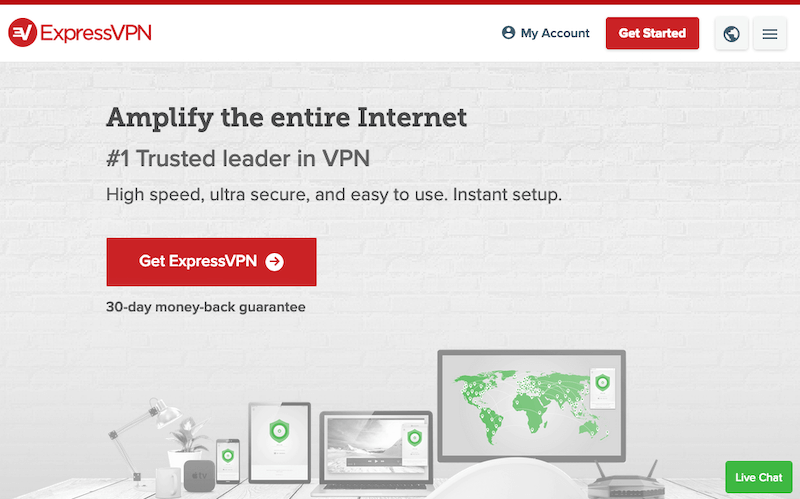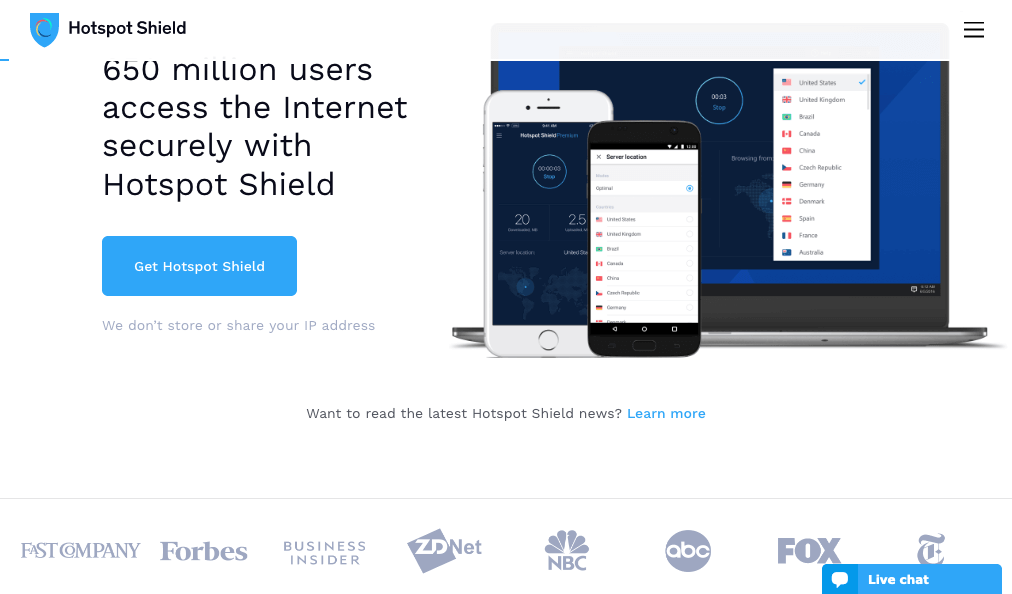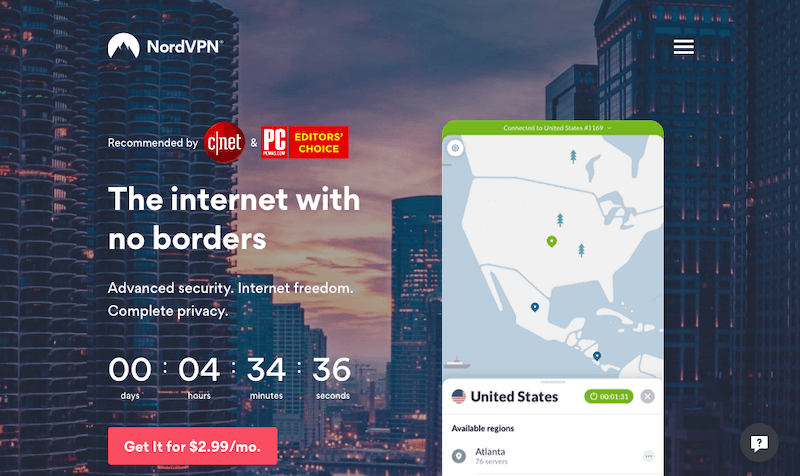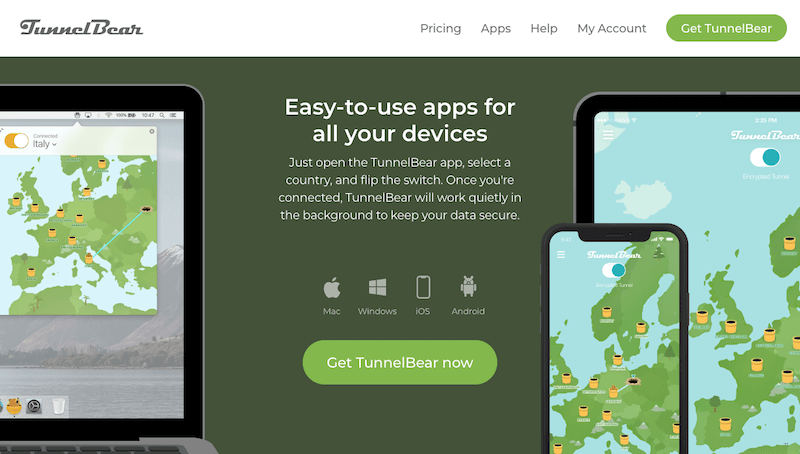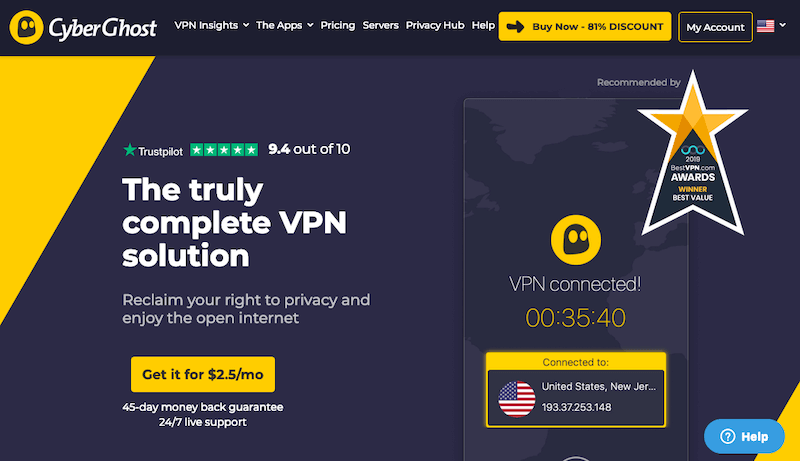Chrome is the most popular internet browsing application used across the world. The actual percentage of desktop users who use Chrome to browse the internet may vary from one study to another, but it always ends up leading all these charts.
There are a lot of factors which make Chrome the popular choice over other web browsers such as Edge (formerly known as Internet Explorer) and Firefox. Chrome turns out to be much more flexible and robust when compared to these browsers.
It is simply too good when it comes to browsing websites and content on the internet. It runs smooth and light, allowing the user to make the most of their internet connection.
But nothing is perfect, and there are some issues which Chrome inherits from its parent company, Google. Google hasn’t had an excellent reputation whenever there is the talk of responsible use of data collected from users.
In fact, they have been found guilty of leveraging the large amount of data they collect from their users across the globe. A lot of people trust this Silicon Valley giant so much that they don’t bother allowing them to handle the most confidential of their data.
There have been instances when Google was found using user data without the user’s permission. On most of these instances, the user had no clue that any such thing was happening. Whether you are using the search engine Google, using an Android device, or browsing the internet using Chrome, you can’t be so sure of your online privacy.
Other than the web browser, there can be a lot of different parties trying to snoop in on what you are doing on the internet. It can be anyone ranging from your internet service provider to a pro hacker. Since browsers are easy targets at times, you can never be sure enough of your online privacy.
It is for these reasons that people turned to VPN services. A virtual private network encrypts your online traffic and transmits it through secure protocols and safer servers so that no one is able to peek into what you are doing on the internet.

It provides you safety as well as privacy on the internet. A VPN application takes care of all the internet traffic that goes through your device. Some VPN services allow you to install a VPN on your router so that all the devices are safe while connecting to the internet.
Because of the stiff competition, VPN services keep coming up with ways to attract more users. One such method of attracting users is to provide broad platform support. The platform support of VPN services often includes web browsers, and Chrome being the most popular web browser, is always in the list.
However, the browser extensions that users get from VPN services are not exactly the same as VPN applications. There are some glaring differences between these browser extensions and actual VPN application.
We will get into much details of this in the later part of this article.
Recommendations
You visited this page to know about the top VPN browser extensions for Chrome, so here they are. You can go through the rest of the article to know how we boiled it all down to these browser extensions.
1. ExpressVPN
More Info: Read Review | Visit Website
A browser extension for Chrome from ExpressVPN brings most of the goodness of a VPN application right at the browser for the user.
However, there is one unique catch to using ExpressVPN browser extension on Chrome, and it is that you need to have the parent VPN application installed on your devices as well. This is quite rare as most of the VPN services don’t impose such a restriction on browser extensions.
Only the subscribers can use the extension, and there is no trimmed down version of the extension which can be used for free.
The merits of having ExpressVPN extension installed on your browser is that you get a large number of server selection options. It also blocks WebRTC, something that a lot of the VPN extensions fail to do.
The extension comes with a kill switch. It blocks the internet traffic on the browser if the VPN connection fails unexpectedly. The ExpressVPN Chrome extension is the most VPN-like thing you will get as a browser extension.
2. Hotspot Shield
More Info: Read Review | Sign Up Free Trial!
Hotspot Shield is one of the popular VPN services which provides users with a way to browse the internet privately. One can use their VPN extension for Chrome without any upfront cost. It doesn’t even ask one to sign-up to use the extension.
There are no bandwidth limits if you are using Hotspot Shield Chrome extension for free, but the catch is that you don’t get to use all the servers available in the network. This leaves the user with fewer options for server connections.
It is especially difficult for Asian users to enjoy the free extension since the majority of their free servers are in Europe and North America. On top of that, the free servers seem to be very crowded, which affects the browsing experience.
Hotspot Shield’s browser extension comes with a lot of additional perks. One can enable Ad blocker, Tracker blocker, Malware blocker, Cookie blocker, etc. All these features combine to provide a safer online ecosystem to the user.
Hotspot Shield has strict privacy policies, which make it easier for the user to trust them with her data. One can subscribe to Hotspot Shield to enhance the capabilities of this browser extension and get access to the VPN application for other platforms and devices as well.
3. NordVPN
More Info: Read Review | Sign Up Free Trial!
NordVPN is a well-established VPN service, with their application being used by a lot of users around the world. They have a vast server network which allows one to get through a lot of regional restrictions with ease.
They make sure that the user’s data is not stored on any of their servers and systems since that is the best way to ensure privacy. A browser extension for Chrome by NordVPN comes with the usual positive attributes of NordVPN. It keeps user’s data safe and helps him bypass regional restrictions with ease.
Most browser extensions use WebRTC protocol by default. This protocol makes it easier for third parties to know your actual IP address, which is a significant blow to anyone’s online privacy.
NordVPN allows one to disable this protocol, thus preventing others from knowing her IP address.
You can also use CyberSec on NordVPN to keep the unwanted ads and malware away from your browser.
One major drawback of NordVPN is that you cannot choose a specific server of a country. It might be a bit irritating for some users to not being able to control such a primary function of a proxy service.
However, the extension makes up for this loss by providing you with the lightning fast browsing experience.
4. TunnelBear
More Info: Read Review | Sign Up Free Trial!
TunnelBear’s browser extension made it to our list because it is free to use, at least to a certain limit. However, it is not just the price which attracted us, but the fact that it comes along with reasonable privacy cover.
They do not log any of the user’s browsing information in any of their servers. The company is based in Canada, which is one of the 5-Eyes countries. This may not be a very good omen when it comes to privacy, but TunnelBear seems to have quite a clean record despite this drawback.
They put a limit on the volume of data that can be transmitted through the extension, and one needs to upgrade the account in order to remove the barrier.
5. CyberGhost
More Info: Read Review | Visit Website
CyberGhost provides its Chrome browser extension for free to users who are not already subscribed to the VPN service. It is a powerful tool for one to hide their IP address and stay anonymous on the internet.
They do not log any information about any of your online activities, eliminating the possibility of this information reaching into wrong hands. You can use this browser extension to bypass various geographical restrictions.
It can be anything ranging from connecting to your favorite game server or to stream your favorite show, which is censored in your country on your subscribed streaming service. CyberGhost has the reputation of bypassing some of the sternest regional restrictions when it comes to streaming services.
There is no cap on the bandwidth consumption while using this browser extension, but you may feel the need for a few more servers. CyberGhost’s free browser extension for Chrome comes with servers in only four countries.
It leads to lesser speed and poor latency, which ruins the internet experience in some ways. However, it is not that significant of an issue for European and North American users as much as it is for others.
CyberGhost browser extension does not protect users from WebRTC leaks which is major drawback on this proxy service.
Are browser extensions same as VPN applications
Let us now address the elephant in the room. How are VPN browser extensions and VPN applications different from each other?
There is more to differ between the two methods other than the fact one only takes care of the online traffic on the browser while the other takes care of all of it.
Most of the VPN browser extensions that you get to download directly from the Chrome Web Store are proxy service extensions.
A proxy service redirects your online traffic the same way an application does. It will redirect it to servers located in some other location, and these servers will, in turn, redirect traffic to the destination location.
It makes the servers at end locations believe that you are accessing the website from the location where proxy servers are present, thus hiding your actual location.
The method is useful when you need to access some geo-restricted content or want to access a website from some different IP address.
VPN applications also work in a similar manner. They redirect the user’s traffic to one of their server locations, and then let is reach the destination. It is the same way they prevent others from knowing your actual geographical location.
The one thing that VPN applications do differently then proxy services is that they encrypt user’s traffic. They not only encrypt the traffic, but they redirect it through secure protocols to ensure that no one is able to get their hands even on the encrypted traffic.
If you doubt how much this encryption matter, then you might be surprised to know that it makes all the difference in the world. It is what makes your internet connection private and secure.
Most VPN services, nowadays, provide military-grade encryptions. These encryptions are impossible to decrypt, which prevents any snooper from knowing about your online activities. Even the browser and the ISP will not be able to know about it.
On the other hand, proxy services merely redirect your traffic to mask your actual location. Since there is encryption of this redirected traffic, it is quite easy for one to know your that you are using a proxy service or make out your actual location.
Proxy services are more vulnerable to cyber attacks and other malign activities of the internet. None of your sensitive information will be safe, and you will be open to all sorts of cybercrimes as you were before using the proxy service.
VPN applications redirect online traffic through secure protocols, which is not the case with proxy services. Your data can be intercepted quite easily when you are using a proxy service.
Proxy services can’t be trusted when it comes to doing some sensitive work on the internet. All parties, including ISPs, government monitoring agencies, browser, etc. will be able to make out what you are doing on the internet and what websites you are visiting.
Most of the browser extensions that are available in the name of VPN services are nothing but proxies. All they do is merely redirect your online traffic.
But let us not draw any conclusions yet. There are some inherent benefits of using a proxy service as well.
Most VPN services come with AES 128-bit and AES 256-bit encryptions. Such robust encryption demands some signification processing capabilities from your device. The encryption also takes its toll on the internet speed.
In some cases, the internet speed reduces down to only a fraction of the original speed. One may need to sacrifice a lot of comfort for the extra layer of privacy and security on the internet.
Proxy services don’t go so hard on your device or the internet speed. Since there is no encryption involved, it does not affect the internet speed very much. It does not demand much from your device as well.
Proxies are easier for devices to manage. It may affect the speed and latency a little bit, but nothing as severe as a VPN application.
So, if you are doing something on the internet which does not concern much with privacy, then you may find proxy services much appealing to change your server location. It can help you get into the game servers you want, help you get more relevant news from one location, etc.
In the end, it depends on the user and their requirements if they should go with a proxy service or a full-fledged VPN service.
Free browsers extensions don’t come cheap
If you visit Chrome Web Store looking for a VPN browser extension, you will find tons of extensions for Chrome which don’t even cost a single dime.
These extensions can be easily installed on Chrome, and they will mask your IP address, making it appear as if you are in some different location.
These browser extensions come with no limits on the amount of data you transfer through them before they start charging you or the number of days after which you will have to pay for the money.
Most users are so busy enjoying the benefits of these proxy services that it never comes to their mind how are these extensions are available for free. There must be some trick, right?
Absolutely right! No one will just serve you with free stuff that works precisely the way it is supposed to work. There has to be something of value for the service provider as well.
The valuable thing that they get by allowing you to use their service for free is your data. Your online data is much more valuable than you think, and all kinds of corporates spend a significant amount of resources to get such data.
With everything shifting to the internet these days, it has become the biggest marketplace. People refer to the internet for things as trivial as a hairpin to as discreet as an idea itself. People will refer to the internet when they want to get their lives on track and when they feel like spending fortunes.
There is no doubt that the internet has a higher number of buyers and sellers compared to anywhere else. It’s a market not just for physical products, but also for digital ones, and the kinds of one that no one ever thought would be something that can be traded.
Phrases such as ‘Data is the new oil’ do not exist without reason.
These free VPN extensions monitor and store your online data, and then use it to their advantage in many possible ways. The data may include all sorts of information including the web series you prefer to watch to the medication you ordered online, giving others an idea about the ailment you or someone close you might be suffering from.
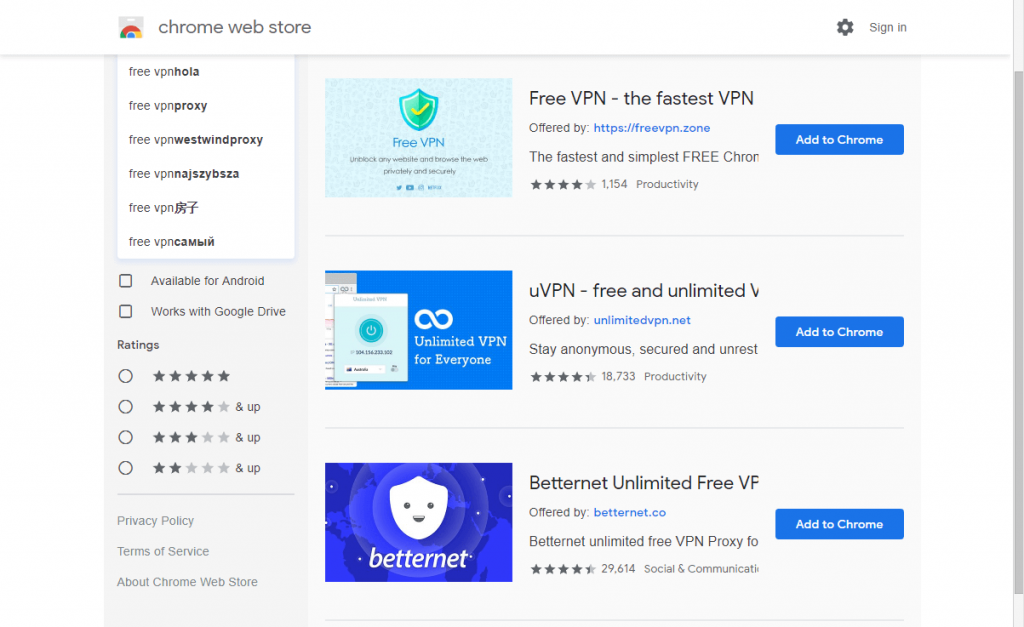
Things may go downhill if your sensitive data gets into wrong hands, and someone tries to leverage it against you.
Most of these service providers will not be very clear about if they are storing your data. Even if they accept that they are storing information about your online traffic, they will not tell you how exactly they are using it.
It is never a good sign if things around the use of your private data are foggy and blurry. One should proceed with extreme caution when getting such services.
They are a few browser extensions which are available for free. Some of them allow you to use their services only for a fixed duration, and then there are some which have a limit on the amount of data you can consume.
Some services may use browser extensions as a lure for users. They may leverage it to get you to subscribe to their premium service on application.
In any case, you should never forget that you will always have to pay some kind of price for a free service.
How to choose a browser extension for Chrome
Let us now come to the most important question- how to select an appropriate browser extension for Chrome.
So far, we have discussed the possible merits and demerits of browser extensions. Getting a VPN extension for Chrome, which serves its purpose, is not much difficult if one pays enough attention to the details.
There are a few questions you need to consider while getting a VPN service, and it should help you make a better decision while choosing a VPN extension for Chrome as well.
There is no doubt that some of these questions need to be tweaked from the point of view of browser extensions as well. So, let’s go through some of them.
For browser extensions, the first thing you need to ask is if it is encrypting the data. We had a lot to say about how browser extensions are merely proxy services which do not encrypt your data and therefore do not provide the robust security of a VPN application.
Well, it turns out that customer support representatives of some of these services claim that VPN services provide military-grade encryption on Chrome extension as well. But we are still very doubtful of their claims.
We invite you to investigate the matter yourself. You can start with the description page of the browser extension.
You will find that a lot of them will claim of providing data encryption through the extension. And you will also notice that none of them will be specific about the kind of encryption available on the extension.
There will be a few services which promise military-grade encryption, but only if you use the extension along with their VPN application.
And if you want to go one step further into the investigation, you can take help of third-party applications. You can use GlassWire and WireShark to confirm if the extension is encrypting the traffic or not.
It is easy to find a tutorial on how to do that. These software help you capture and analyze data packet being transmitted from your device. If the content of the data packet is readable, then it means that there is no encryption whatsoever.
There will be some browser extensions which will encrypt your internet traffic, but that will happen only when you use them along with the parent VPN application. ExpressVPN is one such example.
After data encryption, your biggest concern should be privacy. Since most VPN browser extensions are nothing but proxy services, you should be cautious about who is handling your traffic and redirecting it to different servers.
It is highly likely that if it is a free extension, then the servers might be storing your data. It will not be much big of a deal if you are using the extension for bypassing minor geo-restrictions or just to change your IP.
However, it is always advisable to make sure there is no logging on the service provider’s part. The best way to ensure this is to go through the privacy policy before installing the extension on your browser. If they are not clear about data handling and storage, then there might be something to worry.
Prominent VPN service providers, who have strict privacy policies, are a great choice for an extension when it comes to privacy.
Even though browser extensions do not have a significant influence on your internet speed, they do bring it down a little bit. It causes an increase in latency, as well.
The factors affecting the speed, in this case, are the physical distance between your location and the servers, and traffic congestion on the server. A good service provider will have enough servers that distance, as well as traffic density, will not be much of an issue.
Once you take care of the factors mentioned above, you can look for additional features on the extension, such as if it has adblocking capabilities, malware protection, etc. You can consider pricing as one of the factors as well.

